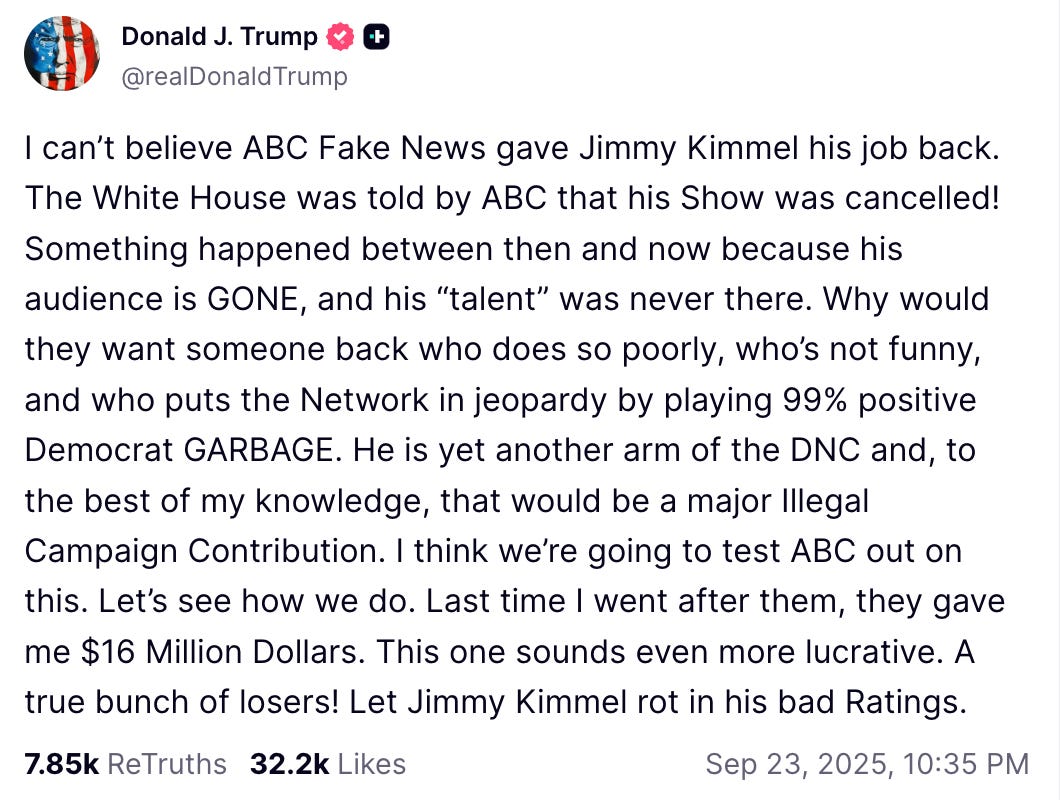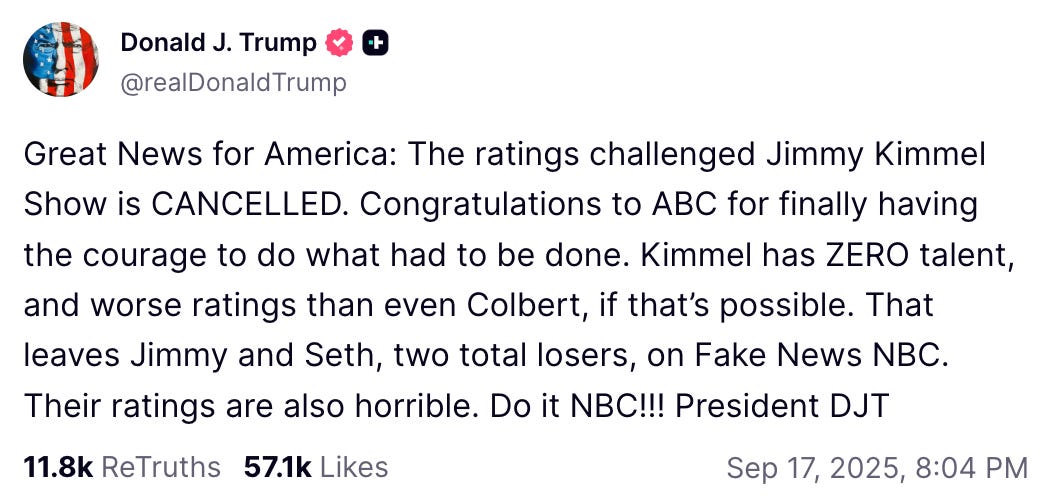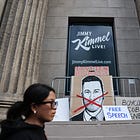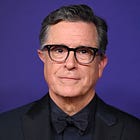FCC's Brendan Carr fails to cancel Kimmel
You can put lipstick on that pig, but it's still censorship.
PN is supported by paid subscribers. Become one ⬇️
On Tuesday, Jimmy Kimmel was back on air after a weeklong suspension. In his heartfelt opening monologue, he punched back at President Trump’s gross assault on the First Amendment.
“Our leader celebrates Americans losing their livelihoods because he can’t take a joke,” he told the audience, earning multiple standing ovations.
Kimmel’s monologue was viewed more than 15 million times in the first 24 hours. And Disney’s decision to reverse its call to yank Kimmel off ABC felt like a turning point — the weaponized federal government is scary, but a million streaming subscription cancellations is scarier.
Of course, Disney could have avoided this entire debacle by refusing to cave to transparently illegal pressure from the government last week. But in some sense, Disney set itself up for this shakedown when it settled Trump’s weak defamation suit last year.
In March 2024, Trump sued the network for defamation after George Stephanopoulos called Trump a “rapist” on air. In fact, a jury found that Trump forcibly penetrated E. Jean Carroll with his hand, not his penis, and so was only liable for sexual assault, not rape, under New York Law.
ABC had some good defenses, but opted to settle the suit for $16 million after Trump won the election.
That may have a been a wise business decision, although CNN media analyst Brian Stelter reports that “numerous critics, including some inside ABC, now look back at that settlement with regret, believing it kicked off a wave of media capitulation to the president.”
And as Trump himself confirmed in a social media post last night, you don’t just pay protection money once.
Censorship by any other name
Trump’s assault on media relies on official accomplices, particularly Federal Communications Commission Chair Brendan Carr.
Carr successfully wielded his position to leverage major concessions from CBS’s parent company Paramount as the price of FCC approval of an $8 billion merger with Skydance. Roughly 10 minutes before that approval, CBS settled a wholly frivolous lawsuit Trump filed in Texas alleging that “60 Minutes” committed consumer fraud by lightly editing an interview with Kamala Harris.
But the $16 million “vig” CBS paid to the as-yet-nonexistent Trump library was only the beginning of the concessions.
Paramount agreed to ditch all DEI programs and promised Carr that it would install an ombudsman to review CBS’s news reporting for bias. Kenneth Weinstein, a conservative MAGA supporter whose nomination to be ambassador to Japan died in the Senate, was tapped for the role. And no one — least of all Trump — believes that CBS just happened to cancel Stephen Colbert right after the deal went through.
Arm-twisting Paramount appears to have emboldened Carr as much as it did Trump. In multiple media outlets, he suggested that the FCC would move against ABC if it didn’t take Kimmel off the air. The threats culminated with a September 17 appearance on rightwing podcaster Benny Johnson’s show.
“We can do this the easy way or the hard way,” Carr said menacingly. “These companies can find ways to change conduct and take action, frankly, on Kimmel, or there’s going to be additional work for the FCC ahead.”
The fake fight for ABC’s affiliates
Trump, who was never one for details even before his brain turned to spaghetti, regularly makes thuggish threats to “cancel” the licenses of media outlets that criticize him.
“They’re 97 percent against. They give me only bad press. I mean, they’re getting a license,” he babbled last week on Air Force One. “I would think maybe their license should be taken away.”
But Carr knows that media networks don’t have a “license” to take away. Local affiliate stations have licenses, and so they can serve as pressure point for the Trump administration to censor the networks.
Here’s how Carr explained it to Johnson:
So again, there’s actions that we can take on licensed broadcasters. And frankly, I think that it’s sort of past time that a lot of these licensed broadcasters themselves push back on Comcast and Disney and say, “Listen, we are going to preempt. We are not going to run Kimmel anymore until you straighten this out because we licensed broadcaster are running the possibility of fines or license revocations from the FCC if we continue to run content that ends up being a pattern of news distortion.”
So, I think again Disney needs to see some change here, but the individual licensed stations that are taking their content, it’s time for them to step up and say this, you know, garbage — to the extent that that’s what comes down the pipe in the future — isn’t something that we think serves the needs of our local communities. But, but this sort of status quo is obviously not acceptable where we are.
That’s an explicit threat to go after local stations for airing Kimmel or other programming that the government objects to — an unequivocal violation of the First Amendment. But Carr twists this even further by claiming that he’s actually protecting the local affiliates he just threatened.
“One thing that we’re trying to do is to empower those local stations to serve their own communities,” he told Johnson.
Carr’s argument is remarkably perverse. Under the guise of shielding independent local media he’s actually extorting it to enact government censorship. And the tool he uses as leverage is the threat that he’ll block mergers of billion-dollar media conglomerates — something which definitionally erodes local media independence.
All of this may have gone over the head of Johnson, who was apparently too stupid to know he was a Russian media stooge. But it certainly didn’t go over the head of those conglomerates!
Shortly after Carr’s appearance on Johnson’s podcast, Nexstar Media Group, which owns 200 local media stations, announced that it wouldn’t run Kimmel anymore. Nexstar hopes for FCC approval of its $6 billion merger with its rival Tegna, which owns 64 media stations. That merger will require a waiver of the FCC rule that limits ownership of more than two full-power television stations in any single television market — a rule specifically designed to promote media diversity and protect local consumers.
But Carr is clearly immune from shame.
“I want to thank Nexstar for doing the right thing,” he crowed. “Local broadcasters have an obligation to serve the public interest. While this may be an unprecedented decision, it is important for broadcasters to push back on Disney programming that they determine falls short of community values.”
Soon Sinclair Broadcasting, which currently owns 193 local stations and hopes to own a whole lot more, announced that it, too, was yanking “Jimmy Kimmel Live!” off the air. Although, to be fair, it’s not clear whether Sinclair was responding to coercion or simply the GOP bat signal. Sinclair’s owners are major Republican donors, and the company routinely pushes “must run” conservative content onto all affiliate stations.
Absolutely none of this was about the needs of local media consumers. Indeed, even after ABC returned Kimmel to the air, Nexstar and Sinclair are still blocking his show on local stations in liberal markets, like Seattle, St. Louis, and Washington DC.
Lies about law
On top of all this, Carr is probably exaggerating his ability to regulate local media stations. On Johnson’s show, he referred vaguely to a “public interest standard.” Later on Fox he blustered that “we at the FCC are going to enforce the public interest obligation. If there’s broadcasters out there that don’t like it, they can turn their license in to the FCC.”
Indeed, the Communications Act of 1934 requires broadcast licensees to operate in the “public interest, convenience and necessity.” And in a 1943 case called NBC v. United States, the Supreme Court held that the Communications Act “puts upon the Commission the burden of determining the composition of [broadcast] traffic.”
But the FCC has only revoked licenses a handful of times in its entire history, and not for decades. There have been zero revocations for “public interest” or “distortion” since Republicans killed the Fairness Doctrine in 1987. And the FCC’s own website acknowledges that “the First Amendment, as well as Section 326 of the Communications Act, prohibits the Commission from censoring broadcast material and from interfering with freedom of expression in broadcasting.”
Carr lamented to Johnson that “over the years, the FCC has stepped back from enforcing it,” without acknowledging that the last four decades of First Amendment jurisprudence likely foreclose the FCC’s ability to regulate broadcaster content. Or as public interest lawyer Andrew Jay Schwartzman told CNN: “Taking away a broadcast license has so many legal obstacles and takes so long that the FCC doesn’t even try. The only exceptions are small radio stations and involve felonious conduct or severe misrepresentations in the application reports to the FCC, and never about program content.”
The battle and the war
In short, Carr is grandstanding about coming down on local affiliates and the public interest. His real power involves doling out the privilege to ruin local media to billion-dollar companies willing to support the MAGA agenda. And while he got significant pushback this time, he’s clearly not finished.
As Kimmel said, Trump “was somehow able to squeeze Colbert out of CBS” and is now “openly rooting for NBC to fire Jimmy Fallon and Seth Meyers.”
“I hope that if that happens or if there’s even any hint of that happening, you will be 10 times as loud as you were this week,” he continued somberly. “We have to speak out against this because he’s not stopping.”
That’s it for today
We’ll be back with more tomorrow. If you appreciate today’s PN, please do your part to keep us free by signing up for a paid subscription.
Thanks for reading, and for your support.








It needs to be mentioned in every article Benny Johnson’s name is brought up that Benny took over $100k in money from RUSSIA to spread their propaganda. This a a vital point that always needs to be made.
It’s not just that Trump - and Miller, and Homan, and Noem, et al. - can’t take a joke … it’s also that they blame “the other” for their own failures.